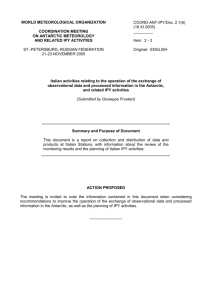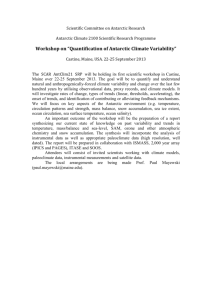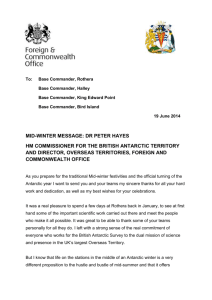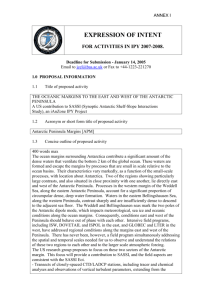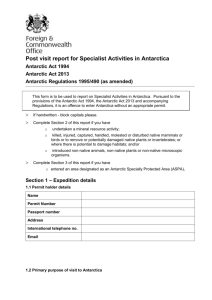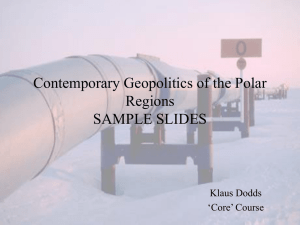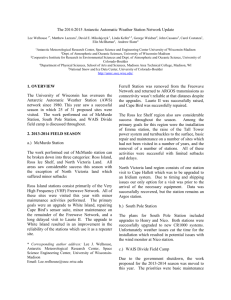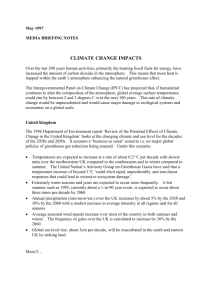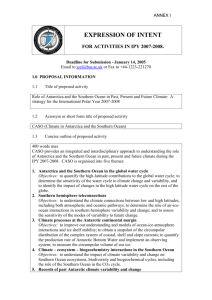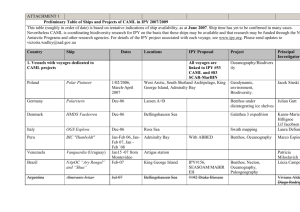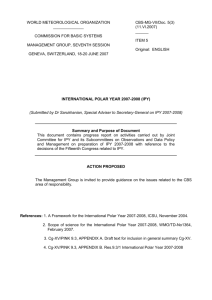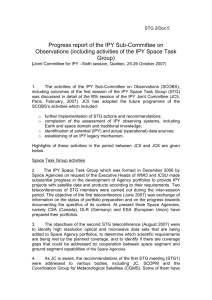Report of activities in the Antarctic - Italy
advertisement
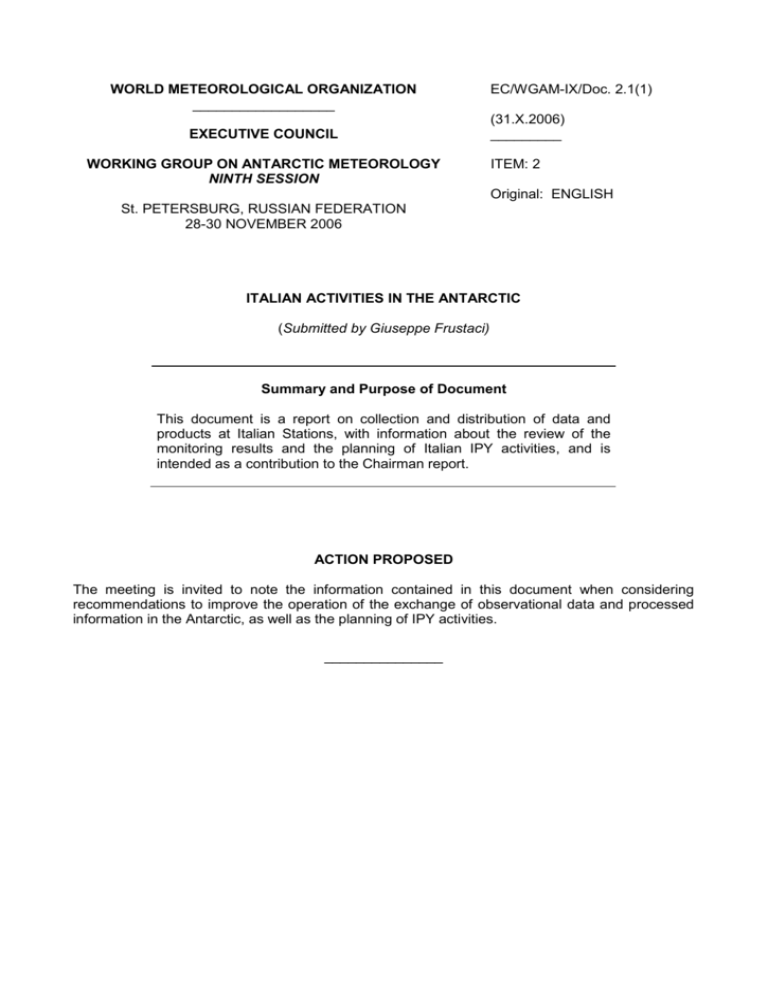
WORLD METEOROLOGICAL ORGANIZATION __________________ EXECUTIVE COUNCIL WORKING GROUP ON ANTARCTIC METEOROLOGY NINTH SESSION EC/WGAM-IX/Doc. 2.1(1) (31.X.2006) _________ ITEM: 2 Original: ENGLISH St. PETERSBURG, RUSSIAN FEDERATION 28-30 NOVEMBER 2006 ITALIAN ACTIVITIES IN THE ANTARCTIC (Submitted by Giuseppe Frustaci) Summary and Purpose of Document This document is a report on collection and distribution of data and products at Italian Stations, with information about the review of the monitoring results and the planning of Italian IPY activities, and is intended as a contribution to the Chairman report. ACTION PROPOSED The meeting is invited to note the information contained in this document when considering recommendations to improve the operation of the exchange of observational data and processed information in the Antarctic, as well as the planning of IPY activities. _______________ EC/WGAM-IX/Doc. 2.1(1), p. 2 Italian Antarctic Activities 1. Observational System A regional network of about 20 AWSs is operated by the National Antarctic Programme (PNRA) in Victoria Land, gradually implemented since 1987 for meteo- and climatological observations, scientific research and support to operations. The oldest one, named Eneide and located at Terra Nova Bay, and the AWSs located at Cape Ross and Cape Phillips, were selected for the Antarctic Basic Synoptic Network (ABSN): 89662 MARIO ZUCCHELLI STATION 89666 CAPE ROSS 89661 CAPE PHILLIPS 74° 41’ 45” S 164° 05’ 32” E 76° 42’ 54” S 168° 58’ 12” E 73° 31’ 16” S 169° 45’ 55” E 92 m 150 m 536 m During summer, SYNOP and METAR messages are compiled at Mario Zucchelli Station (MSZ at Terra Nova Bay) using AWS 89662 data and visual observation by the local meteorologist, normally affiliated to the National Meteorological Service or to other National Meteorological Institutions. At the same location and with the same number is also operated during summer a (not automatic) radio sounding station, issuing TEMP reports. Other numbers have been recently assigned by WMO for 4 more AWS: 89648 89646 89659 89625 MID POINT SITRY PRIESTLEY CONCORDIA 72° 32’ 10” S 71° 39’ 12” S 73° 38’ 21” S 75° 06’ S 145° 51’ 32” E 148° 39’ 08” E 160° 38’ 44” E 123° 24’ E 2509 m 2094 m 1924 m 3233 m The last one, Concordia, is operated similarly to Mario Zucchelli Station and issues SYNOPs and TEMPs. All of the above mentioned surface stations produce SYNOP messages every 6 hours, while the radio sounding stations (89662 at Terra Nova Bay and the new one 89625 at Concordia) issues TEMP messages during summer months (October to February) normally every 12 hours (main synoptic hours). Data from all the AWSs are also stored locally (Flash card, EPROMS or HD) and posted on the website www.climantartide.it. In part they are also collected by ARGOS in real time: ARGOS WMO ID NR. NAME LOCATION 1218 1626 1627 7350 “ 7352 7353 7354 7355 7356 7357 7379 Irene Italica Giulia Sofia Sofia-B Zoraida Eneide Rita Modesta Lola Arelis Silvia Sitry / Mid Point Nansen Ice Sheet David Glacier Priestly Glacier Mario Zucchelli St. Enigma Lake Priestley (Nevée) Tourmaline Plateau Cape Ross Cape Phillips 89646 / 89648 / / / 89662 / 89659 / 89666 89661 POSITION Ship 74°48’ S 163°19’ E, 40m 75°36’42”S 158°35’26”E, 1552m 74°15’23”S 163°10’17”E, 644m 74°43’30”S 164°01’59”E, 268m 74°38’07”S 163°25’50”E, 1620m EC/WGAM-IX/Doc. 2.1(1), p. 3 Some other stations do not provide continuous measurements: Itase (traverse) did not work continuously but only in those years when Antarctic plateau was crossed; Italica (ship) is activated for two month during navigation; Penguin collects data in Edmonson Point remote camp only during base opening; Paola collect data at Talos Dome; Alfa & Bravo collect wind data along C130 runway; they are mounted at base opening and disassembled after last fly; data are sent directly to operational room and not stored; Maria is located at Browning Pass; Minni collects wind data along Twinotter runway in Browning pass; it is mounted in November and disassembled at base closing; these data too are sent directly to the operational room and not stored; Enigma and Jennica are operated around Mario Zucchelli Station. Further, Sofia was moved on November 2002. Since the name is bound to the site, it was re-named as Sofia-B, but Argos code is the same. Mario Zucchelli Station (89662) and Concordia (89625) are in the Antarctic Basic Climatological Network (ABCN). CLIMAT and CLIMAT TEMP reports are planned but have not been produced until now. Geographical position of all the stations is undergoing verification with GPS. 2. Telecommunication system The telecommunication system underwent a major modification following the unavailability of some nodes occurred during 2004, and this explains the monitoring results of 2005. Full operational GTS distribution was expected again at the beginning of the Antarctic summer 2005-2006. TEMP messages from 89662 have been not available during summer 2004-2005 because of a failure of the ground radio sounding system, which could not be recovered in the Antarctic. AWS data (only for stations with an ARGOS identification number) are collected by ARGOS System. Surface data from AWSs with WMO number are coded into SYNOP code by CLS-ARGOS and are inserted into the GTS at RTH Rome. SYNOP and TEMP reports produced at Mario Zucchelli Station (Terra Nova Bay) and Concordia Station are transmitted via Internet to RTH Rome to be inserted into the GTS. Locally available observational data and processed information is not broadcast; METAR and TAF messages produced at Terra Nova Bay (NZTB) are nevertheless transmitted via email to McMurdo Station and Christchurch (NZ), and all information can be made available on demand by e-mail or via Internet. EC/WGAM-IX/Doc. 2.1(1), p. 4 3. Data processing system Processed data is normally produced at the Italian National Weather Centre (CNMCA, at Pratica di Mare near Rome) of the National Meteorological Authority and made available at M. Zucchelli Base via Internet. In some cases specific analysis and forecasts can be prepared locally for traverse, navigation, expeditions, etc.. TAF messages are also issued at Mario Zucchelli Station (NZTB) during summer to assist aircraft operations. Processed data is mainly based on ECMWF products. Recently, the hydrostatic limited area model operational at the NMS has been adapted for the Antarctic and is undergoing test. Similar adaptation of the non-hydrostatic Local Model is planned for 2007. AMPS-Polar MM5 forecasts are also made available twice a day for MZS by NCAR, via Internet. 4. International Polar Year 2007–2008 (IPY) Common planning for a PNRA and NMS joint effort produced in 2005 a document in the form of an Expression of Interest, submitted for approval to IPY CO. It was acknowledged in February 2006 with Nr.1094 (Polar Operational and Climatological Modelling), and linked to IPY Full Proposal Nr. 180 (Antarctic Climate and Atmospheric Circulation). The main points of the EoI are underlined in the Annex. In the same framework a detailed joint proposal is pending at the National Scientific Commission for approval and funding in 2007-2008. EXPRESSION OF INTENT Nr. 1094 FOR ACTIVITIES IN IPY 2007-2008. 1.1 Title of proposed activity Operational High Resolution Modelling and Multi Modelling in Support of Meteorological, Climatological and General Research in Polar Regions. 1.2 Acronym or short form title of proposed activity Polar Operational and Climatological Modelling. 1.3 Concise outline of proposed activity Polar scientific activity need more and more meteorological support, not only for operations, but also for the necessary background and interdisciplinary knowledge. Under this respect, operational meteorological support is generally available from global or limited area models at relatively low spatial and temporal resolution, while HR research model are only set up for time limited field phases or run for specific case studies. Therefore, there is a lack of extended climatological knowledge of detailed surface and low tropospheric circulation at the meso- and local scale, especially regarding important aspects of polar weather as katabatic flow, barrier winds, precipitation, etc. Aim of the project is setting up a complete operational chain, assimilating standard and not standard observations, and producing regularly operational analysis and forecasting at very high spatial (3 km or less) and temporal resolution, using a nesting of global and limited area (hydrostatic and non hydrostatic) models with specific treatment of coupled processes as, for example, polynya formation, and validated through operational observations. Results, in form of real time graphics and data in GRIB format, shall be accessible by the interested scientific and logistic community in quasi real time, while validated outputs should be available in the shortest possible time and not later than a year after. Operational assimilation of the observations being an essential part of the project, specific actions will be carried out for the calibration and operational verification of observational instruments and for the assimilation of non conventional data from operational and research new instrumentation, especially ground and space based remote sensing. On the basis of the finer knowledge gained through operational analysis and forecasting, and related validation processes, climatological studies shall also be carried out in order to investigate local modifications and possible teleconnections. EC/WGAM-IX/Doc. 2.1(1), p. 2 1.5 Significant advance(s) in relation to the IPY themes and targets Operational model runs for: - Weather Analysis and Forecasting in support to operations and research - Advances in regional and local climatological knowledge, and verification with HR standard and special observational data - Specific investigation of polar phenomena as katabatic and barrier winds, etc. Improvement of atmospheric observations (soundings and remote sensing) and calibration Climatological simulations 1.7 International collaboration Coordination in the framework of WMO-THORPEX IPY Coordination in the framework of “Antarctic Climate and Atmospheric Circulation” (Full Proposal ID No: 180) Contact to SCAR and involvement of COSMO (LM) Cooperation with LGGE (F) 2.0 FIELD ACTIVITY DETAILS 2.1 Outline the geographical location(s) for the proposed field work East Antarctica (South Pole to Adelie Land to Victoria Land and Ross Sea) Extension to Svalbard in the Arctic 2.2 Define the approximate timeframe(s) for proposed field activities? Arctic Fieldwork time frame(s) 05/07 – 04/08 mm/yy – mm/yy mm/yy – mm/yy 2.2 Antarctic Fieldwork time frame(s) 03/07 – 12/08 09/06 – 02/07 09/05 – 02/06 Significant logistic support/facilities M. Zucchelli Base at Terra Nova Bay, Dome C, Dirigibile Italia Station at Ny Alesund (Svalbard). Polar Ships, Fixed wings geophysical aircraft, Helicopters, Met. Satellites, Observatories, Field Stations, Special sounding and remote sensing instrumentation (sodar, additional radiosounding equipment, radar). Operational infrastructure of Itl. Met. Service. Linux cluster for operational model runs. EC/WGAM-IX/Doc. 2.1(1), p. 3 2.3 Project legacy of infrastructure Special instrumentation Climatological data Operational modelling set up 2.5 Required logistics will be secured by: Own national polar operator Military support 2.6 Endorsement at national or international level Sent to the National Commission, endorsed by “Antarctic Climate and Atmospheric Circulation” (Full Proposal ID No: 180), submission to THORPEX IPY planned, proposal for National Research Agency in preparation. 3.0 PROJECT MANAGEMENT AND STRUCTURE 3.1 The project as a component of an existing plan, programme or initiative New project of Operational Modelling in the framework of existing polar activities and international cooperation. 3.2 Organisation and management Organisation by Italian. Met Service and PNRA Management by PNRA, using existing organizational structure and Antarctic logistic infrastructures, and by Italian Met. Service for operational production using specific arrangements integrated in the existing operational infrastructure of CNMCA, the National Operational Weather Centre. 3.3 Initial plans of the project for addressing the education, outreach and communication issues Education and Communication planned via already existing: - permanent Antarctic Expositions - agreement to National TV and Radio Broadcasting Corporation (RAI) - Italian. Met Service and PNRA web sites - Graduate and PhD grants 3.4 Initial plans of the project to address data management issues EC/WGAM-IX/Doc. 2.1(1), p. 4 Real time availability via ftp by registered users of: - operational model outputs (graphics and GRIB format) - operational observations for research and operation purposes. Validated data available in 12 months to the same and other users for research 3.5 Project funding A proposal for IPY special funding is pending at National level. 3.6 Additional information - 4.0 term imprimatur by IPO will improve chance of national special funding to be approved Project is developed in the framework of THORPEX IPY and shall be submitted also to THORPEX PROPOSER DETAILS Lead Contacts for the Expression of Intent Title First Name Surname Organisation Address Postcode/ZIP Country Telephone Email Dr. Giuseppe Frustaci Italian Met. Service (UGM) - CNMCA Aeroporto De Bernardi - Via di Pratica di Mare,45 – Pomezia (RM) I-00040 Italy +39 06 9129 3209 g.frustaci@meteoam.it Title First Name Surname Organisation Address Postcode/ZIP Country Telephone Email Dr. Andrea Pellegrini PNRA SCrl Centro Ricerche Casaccia, Via Anguillarese, 301 - Roma I-00060 Italy +39 (06) 3048 4165 andrea.pellegrini@consorzio.pnra.it ______________
